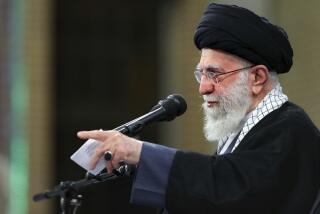U.N. Chief, Iranian Confer on a Date for Cease-Fire
- Share via
UNITED NATIONS — U.N. Secretary General Javier Perez de Cuellar met Monday with Iranian Foreign Minister Ali Akbar Velayati to make final preparations for setting a cease-fire date ending the Iran-Iraq War.
Perez de Cuellar has said he intends to fix a cease-fire date as soon as a nine-member fact-finding team returns Wednesday from its 10-day mission to Iran and Iraq.
Velayati, after his sixth session with the secretary general since talks began here last week, said Iran has met all the U.N. leader’s requests.
Perez de Cuellar, leaving the U.N. headquarters later, told reporters that both sides now agree on the need for face-to-face talks--”the only difference is over timing.”
The secretary general conceded that the Iraqis still want direct talks before a cease-fire is set. Iran has said it will consider face-to-face negotiations after a cease-fire is in effect. Perez de Cuellar said he was continuing negotiations with Iraqi Foreign Minister Tarik Aziz, with whom he will meet for the fourth time today.
Also Monday, the Security Council made public two long-awaited reports on the use of outlawed chemical weapons in the eight-year war.
Nerve Gas Possible
One report, confirming Iran’s frequent complaints about Iraq’s use of mustard gas, said there had been “repeated utilization” by Iraqi forces of the gas and indicated that cyanide and nerve gas also may have been used.
The other report, on an Iraqi charge that Iran too had used chemical weapons, said evidence has been found of mustard gas on fragments of 81-millimeter mortar grenades after an “alleged Iranian attack.” It said nine Iraqi soldiers had been injured by mustard gas.
Iraqi officials contended that the grenades could have been used only by Iranian forces, because the Iraqis use 82-millimeter mortars exclusively. But the report noted that 81-millimeter projectiles can be fired from the larger mortar.
The two experts who carried out the study, Dr. Erik Dahlgren of the Swedish Defense Research Institute and Dr. Manuel Dominguez Carmona, a Spanish army medical corps specialist in chemical weapons injuries, were in Iran from July 1 to July 5 and in Iraq on July 10 and 11.
Intensive Scale
“Chemical weapons continue to be used on an intensive scale against Iranian forces,” they said in a letter accompanying their report.
“The use of yperite (mustard gas) was . . . confirmed both medically and by chemical analysis. The use of nerve gas or cyanide was not confirmed by chemical analysis in the field, no doubt owing to their rapid disappearance. It may thus be necessary to review existing machinery for verification by United Nations teams of the use of chemical weapons in order to ensure the timely presence of experts at the site of alleged attacks.”
Chemical weapons are outlawed under the 1925 Geneva Convention, and the Security Council recently condemned use of the weapons in the Persian Gulf conflict.
The Iranian ambassador to the United Nations, Mohammed Mahallati, hailed the publication of the reports as proof of Iran’s charges against the Iraqis. An Iraqi mission spokesman declined to comment.
More to Read
Sign up for Essential California
The most important California stories and recommendations in your inbox every morning.
You may occasionally receive promotional content from the Los Angeles Times.









